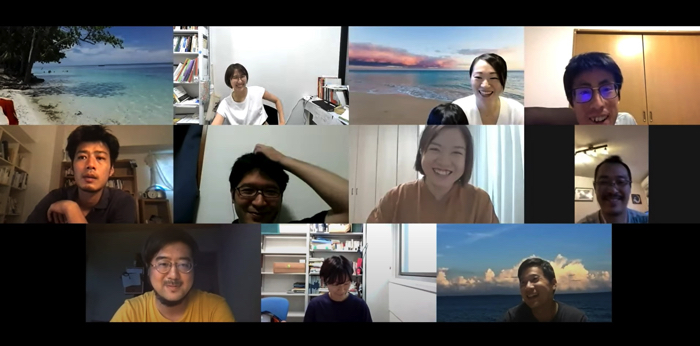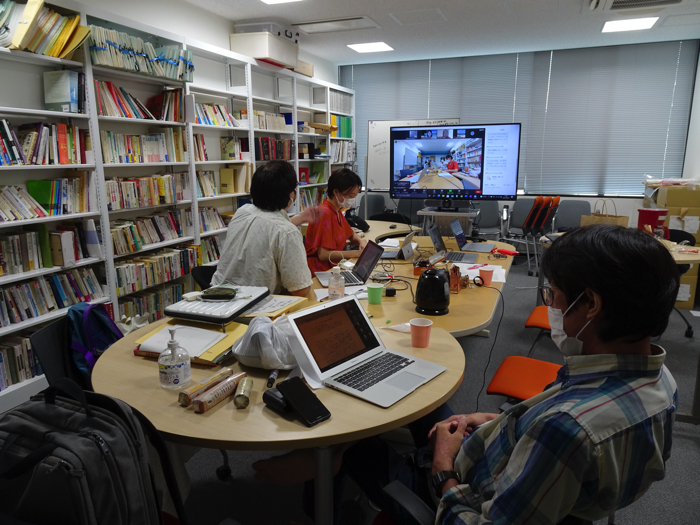- Project Leader : Shiraishi Natsuko (Osaka University, Graduate School of Language and Culture)
- Collaborators : Hara Tamiki (Chiba University of Commerce)
- : Nishio Zenta (Kyoto University, Center for Southeast Asian Studies)
- : Kusaka Wataru (Nagoya University, Graduate School of International Development)
- : Kubo Yuko (The University of Tokyo, Graduate School of Arts and Sciences)
- : Tagawa Yumeno(Hiroshima University, Graduate School for International Development and Cooperation)
- : Nakakubo Keisuke (Tokyo University of Agriculture, Faculty of International Agriculture and Food Studies)
- : Fujiwara Naoki (Osaka University of Human Sciences)
- : Miyagawa Shinji (The University of Tokyo, Graduate School of Arts and Sciences)
- : Morota Fumiko (Kyoto University, Graduate School of Asian and African Area Studies)
- : Yoshizawa Asuna (Kyoto University, Graduate School of Asian and African Area Studies)
- : Mario Lopez (Kyoto University, Center for Southeast Asian Studies)
- : Iida Yuya (Kyoto University , Graduate School of Agriculture)
Outline of Research
This study critically reconsiders changes in contemporary Philippine society through cases and findings from the research members’ long-term fieldwork. Previous studies have noted the significance due to the “penetration of neoliberal governance” and the “internalization of neoliberal values.” However, as some studies have shown, the “rise of neoliberalism” actually differs according to individual communities and problem areas. Our research group will explore this by critically deconstructing the idea of neoliberalism itself by based on long-term field work of research team members. Through this discussion, we aim to present a new perspective on the globally shared issues of “the dominance of neoliberalism.”
Description
The expansion of inequality and violence caused by the rapid rise of neoliberalism has recently become an essential part of debates around social change, not only in the Philippines, but also in the Global South as a whole. Previous studies note the different nature of the rise of neoliberalism across different regions: in Western societies, it has occurred concurrently with fragmentation of society into anonymous individuals, while in the Global South, neoliberal governance is permeating and gaining strength through local social relations and community networks. In those previous studies, the debate around neoliberalism has taken the form of a critiquing crises that occur due to permeation of neoliberalism through norms and practices within communities.
In contrast, this study reconsiders the discussion of “the penetration of neoliberal values” itself. The social reality of “neoliberalism manifests” differently according to region or subject. In order to clarify and overcome the current problems surrounding the “penetration of neoliberalism,” we have to elucidate the details of several processes of restructuring values and subjectivity. The study therefore aims to better understand the reality of people’s struggles and complex interrelationships.
The study’s originality lies in its approach of deconstructing the critiques of neoliberalism by rejecting “subjectivities that embrace neoliberal values” and instead examining how institutions and subjectivities have been reconstructed. This is an exploratory approach to rethink the limits and possibilities of a form of subjectivity that has been criticized in the past, without turning a blind eye to the inequalities and violence generated by neoliberal governance.
The rethinking of such a complex idea as neoliberalism requires collaborative research to combine multiple perspectives. The study therefore builds on the results of long-term fieldwork by a group of scholars specializing in such diverse topics as religion, politics, economics, production, risk, gender and care. While such a collaborative approach is not unique in itself, our members’ field data from long-term surveys conducted in the middle of a rapidly changing society have great potential and significance for this topic. This study will critically reexamine the debate over neoliberalism in contemporary society from the perspective of area studies.
This study of the complex social reality of the Philippines, a society deeply involved in the global economy from the level of everyday life to that of the macro-political economy, will also provide salient insights into Japanese society, where individual fragmentation has become serious and community-based social systems seem to be reaching their limits.
 Online meeting in August 2021 |
 Hybrid meeting in September 2021 |
